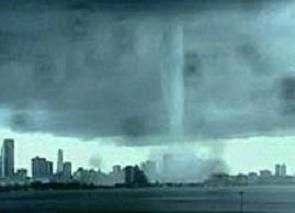Horizon
The Hunt for the Supertwister (2004x17)
:
On 3 May 2003 a tornado smashed through two suburbs of Oklahoma City. It had struck at the height of the tornado season, yet residents were still shocked by the destruction it wrought. Eight thousand homes were destroyed, a billion dollars of damage was wreaked and 40 people lost their lives. What had hit Oklahoma City that day was not just any old tornado - it was a super-twister.
Tornadoes are classified on the Fujita scale, or F-scale. Most tornadoes that occur around the world can be classified on the lower reaches of the scale - the F0s, F1s or F2s. These can still cause damage and have winds in excess of 160km/h.
Supertwisters are an altogether different beast. Terrifying and destructive, at their most extreme they are powered by wind travelling in excess of 480km/h. This is strong enough to lift strong framed houses from their foundations and seriously damage even reinforced concrete.
Every year hundreds of people around the world are killed or injured by supertwisters. Yet what makes them even more terrifying is that it is practically impossible to predict their appearance or movement. Why they form in the first place remains a mystery.
Most US tornadoes occur in Tornado Alley, a flat mid-western stretch from Texas in the south to the Dakotas in the north. High season for supertwisters tends to be during spring, from March to June.
Tornadoes usually appear during a thunderstorm. Supertwisters are associated with super-cells, the largest thunderclouds of all. These are enormous rotating columns of air that can be over 30km across and 18,000 metres high - twice the height of Mount Everest.
All tornadoes form when warm, moist air is pushed upward by a mass of cold air. This creates an updraft within the stormcloud that can cause a large mass of circulating air. When this air comes in contact with the ground it becomes a tornado. What is not known is precisely what triggers this final stage to form a tornado...
A group of scientists are tryi
